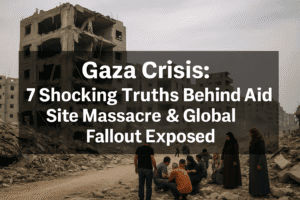Gaza Crisis: 7 Shocking Truths Behind Aid Site Massacre & Global Fallout Exposed
At least eight Palestinians were killed near Israeli-U.S. aid sites in Khan Younis, with witnesses blaming IDF troops amid a collapsed humanitarian system. Israel shifted forces from Gaza to northern borders, anticipating attacks by Iran-backed militias like Hezbollah. UK Labour leader Starmer faces internal revolt as unions demand immediate recognition of Palestine, while 150,000 Dutch protesters condemned Gaza’s siege. Civilians report intensified IDF strikes and severe water shortages after 20 months of war.
Hostage talks remain stalled as regional tensions with Iran complicate negotiations. The aid-site tragedy underscores how trapped civilians now risk their lives for basic survival, exposing systemic failures in protection. Global responses reveal deepening fractures over accountability as civilian suffering persists.

Gaza Crisis: 7 Shocking Truths Behind Aid Site Massacre & Global Fallout Exposed
A pre-dawn shooting near U.S./Israeli-supported aid distribution points in Khan Younis killed at least eight Palestinians and wounded dozens on June 15. Health officials confirmed the casualties as civilians gathered for food aid. Witnesses described the scene as a “trap,” with gunfire allegedly originating from Israeli forces. The IDF has yet to comment, but the incident underscores the lethal risks civilians face while seeking basic survival. This tragedy follows UN criticism of Gaza’s aid infrastructure, revealing systemic failures in protecting vulnerable populations.
Military & Geopolitical Shifts:
- Redeployment: Israel has begun shifting troops from Gaza to reinforce its northern borders (Lebanon/Syria) and eastern front, anticipating infiltration attempts by Iran-backed militias like Hezbollah (Haaretz). This reflects a strategic pivot toward multi-front deterrence amid heightened regional tensions.
- Hostage Dilemma: Israeli officials are assessing how recent direct confrontations with Iran impact stalled negotiations for Gaza hostages. Mediation efforts (led by Qatar/Egypt/U.S.) face compounded complexity as regional escalation overshadows local cease-fire talks.
- Alleged Escalation: Gaza residents report intensified IDF attacks following April’s Israel-Iran exchanges, describing indiscriminate fire in densely populated areas – a claim that remains unverified but amplifies civilian distress.
Global Echoes:
- UK Political Rift: Labour leader Keir Starmer faces internal rebellion as major unions (TUC, joined by French/Canadian counterparts) demand immediate recognition of Palestine. The pressure highlights a growing divide between political pragmatism and grassroots demands for moral action (The Independent).
- Dutch Protests: 150,000 demonstrators formed a “red line” in The Hague, condemning both Israel’s siege of Gaza and Dutch government policy. This second massive rally in a month signals sustained European public outrage over civilian suffering (Reuters).
- UK Military Posture: Britain’s chancellor hinted at potential military support for Israel, stating the government would “not rule anything out” – a stance that could strain Western unity (Sky News).
Deepening Humanitarian Crisis:
- Palestinians report severe drinking water shortages, exacerbating a health catastrophe after 20 months of conflict.
- The aid site shooting illustrates the grim reality: humanitarian spaces are becoming perilous. With 11 more killed near distribution centers in separate incidents, trust in aid systems is eroding.
On the Ground Realities:
- Sergeant First Class Noam Shemesh (Kfir Brigade) was buried in Jerusalem, a reminder of Israel’s ongoing losses.
- Tehran residents faced panic during strikes linked to the Gaza conflict, revealing how regional tensions spill beyond immediate borders (Washington Post).
Why This Matters
The Khan Younis shooting isn’t an isolated incident. It’s a symptom of a collapsing humanitarian framework where civilians pay the price for political and military failures. Israel’s troop redeployment suggests a long-term, multi-front strategy, potentially prolonging Gaza’s instability. Meanwhile, global responses – from union demands to massive protests – reveal a world increasingly polarized over accountability and justice.
The Unanswered Question:
As aid sites become battlegrounds and regional conflicts intertwine, how can civilians be protected when humanitarian corridors themselves are targets? Until this is resolved, cycles of violence and suffering will persist.
You must be logged in to post a comment.